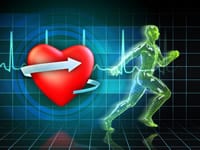A strong healthy heart is central to your well-being. In recognising the importance of accurate heart assessments, The GP Surgery London offers the services of a leading echocardiographer who hails from the world-renowned Royal Brompton and Harefield NHS Foundation Trust.
Didar Alam has many years of experience in paediatric, adult congenital and adult echocardiography. Available in Wimbledon on Saturdays, he is highly skilled in performing complex studies with the latest technologies, including doppler, 3D/ 4D and speckle tracking.
What is a transthoracic echocardiogram?
A heart specialist (cardiologist) or GP will request an echocardiogram, or “echo”, to check whether you might be suffering from a heart disease or conditions.
A transthoracic echocardiogram, also called a TTE or heart ultrasound, is a non-invasive way to test blood flows through the heart chambers and valves.
A small probe is used to send out high-frequency sound waves that create echoes when they bounce off different parts of the body. These echoes are picked up by the probe and turned into a moving image on a monitor while the heart scan is performed.
Why would I need an echocardiogram?
An echocardiogram can help diagnose and monitor certain heart conditions by checking the structure of the heart and surrounding blood vessels. It analyses how blood flows through the heart and provides an assessment of the pumping chambers of the heart.
An echocardiogram can help detect:
- Damage to your heart after a heart attack: When the blood supply to the heart was suddenly blocked during a heart attack, an echocardiogram can see how much damage has occurred to your heart and repeated scans can be done over time to check if it is improving.
- Heart failure: This is when the heart fails to pump enough blood around the body at the right pressure. The echocardiogram can show how badly weakened the heart wall muscles are and the exact pressure at which the heart is pumping. Repeated scans over time can show if this is improving or worsening.
- Hypertension (high blood pressure): This can cause damage to the heart by thickening the wall muscles and eventually causing heart enlargement.
- Heart valve problems: Sometimes the heart valves can be too “tight” and prevent the heart from pumping adequate blood around the body…Or they may be too “leaky” and cause the heart to become enlarged.
- Congenital heart disease:– Many birth defects can prevent the heart from functioning normally.
- Cardiomyopathy: The heart walls become thickened and enlarged due to various causes, including viral and alcohol overuse.
- Endocarditis: An infection of the heart valves which can cause permanent damage.
Do I need to prepare for an echocardiogram?
On the day of the echocardiogram, eat and drink as you normally would. Take all of your medications at the usual times, as prescribed by your doctor.
What to expect
You should feel no major discomfort during this non-invasive test.
For the exam, you will be asked to remove your clothing from the waist up. Your cardiac physiologist (sonographer) will place three sticky electrodes on your chest. The electrodes are attached to an electrocardiograph monitor that charts your heart’s electrical activity.
While lying on your left side on the exam table. the sonographer will place a wand (called a sound-wave transducer) on several areas of your chest. The wand will have a small amount of gel on the end, which will not harm your skin. The gel is used to help produce clearer pictures.
Sounds are part of the Doppler signal: You may or may not hear the sounds during the test.
You may be asked to change positions several times during the exam in order for the sonographer to take pictures of different areas of your heart.
The sonographer might also request that you hold your breath at times during the exam.
Are there any risks?
An echocardiogram poses no risks. Even if you are pregnant, you are able to safely have this examination.
What will it cost?
| Diagnostic Test | Price |
|---|---|
| Adult Echocardiogram Over 18 years old | £199 |
| Paediatric Echocardiogram From 3 to 17 years old | £270 |
Results and report
- A full consultation with your cardiac physiologist is included in the price.
- You will receive a report of the findings. Images will only be sent to your NHS GP or medical clinic with your consent.
How to make an appointment
- Bookings can be made online or telephonically.
- If you cannot find an early appointment on our online bookings page, please call us and we will book you in for an urgent echocardiogram (costs of £220 for adults and £285 for paediatrics).
- We require at least five days’ notice should you want to cancel your appointment. Your deposit will be retained if you provide notice at a later stage.
- Arrive at least 10 minutes before your appointment to allow adequate time for the registration process.
Private Ultrasound scan in London:
.



